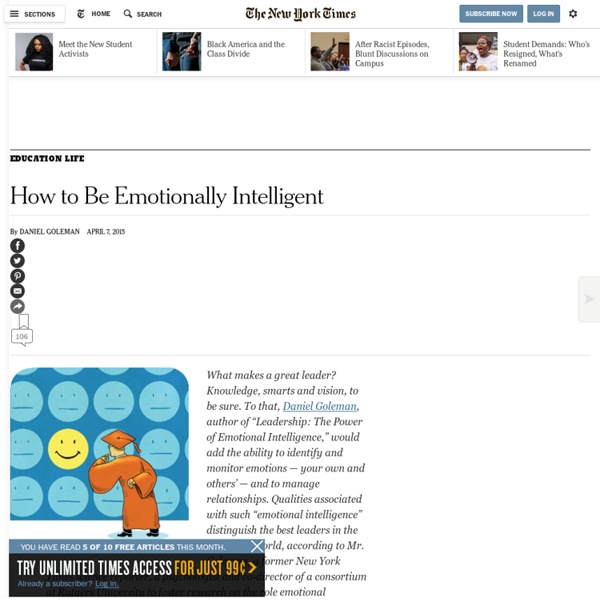



http://www.nytimes.com/2015/04/12/education/edlife/how-to-be-emotionally-intelligent.html
Related: Emotional Intelligence • Multiple Intelligences • My RelationshipsStephen Covey on Developing Emotional Intelligence “I don’t want to be at the mercy of my emotions. I want to use them, to enjoy them, and to dominate them.” ? Oscar Wilde Emotional Intelligence is essentially an ability, capacity, or skill to assess, manage, and regulate the emotions of yourself and others. The Feeling Wheel : Type A Lifestyle How to Use “The Feeling Wheel” In my book I’m a Type A—How the Heck Will I Ever Retire? I stress the importance of Type As being aware of their feelings and emotions as a way to better being able to relax. It is often unaddressed feeling and emotions that make it difficult for Type As to quiet their minds and fully relax. How To Be Someone People Love To Talk To When do we really learn good conversation skills? Well, we don’t. We’re just kind of expected to pick them up… And we wonder why people aren’t better communicators. How can you be that person people love to talk to? I’ve posted a lot of research and expert interviews on the subject so let’s round up the info and make it actionable.
Signs That You Lack Emotional Intelligence Executive Summary Often, emotional intelligence is the key differentiator between a star performer and the rest of the pack, yet many never embrace the skill for themselves. Do you think being liked at work is overrated? Are you surprised when others are offended by your comments, and do you feel like they’re overreacting? How Much To Give And Take In Relationships – Kris Gage Emotional boundaries are my big question right now I always have a big question in my head, and it’s always about love — and life. After I broke up with my boyfriend of five years in 2014, my question was around “personal agency” and “real love” — specifically, whether someone can really love us if they see us differently (lesser and more superficially) than we see ourselves; if there is no “true” reality, then which version of “us” is real? Do we get final say in who we are and how we want to be seen (and loved?) (Side note: after 3 years and countless books, Emma Lindsay’s essay “Fish Love” is the closest and best answer I found.) Last year, it was around emotional abuse —and what constitutes it — which lead to healthy vs. toxic love.
The Art of Being 'Generative' - SHIFT-IT Coach I had a personality test done a few years ago – back when I was in a coaching group with some other online entrepreneurs. It gave me some really revealing results about myself and my style of relating. Or, should I say, my styles (plural) of relating. The test showed that I am a split personality of sorts — I have a very nurturing and supportive side (hence being a great coach, friend and overall cheerleader) and I also have a very driven and results oriented side (hence being a strong strategist and businesswoman). These two types are almost polar opposites — the test I took described this as a classic ‘creative personality’ (hmmmm, guess I’m a textbook case on that one given what I do and all!). Common Temperament and Style Tests: You might have taken different typologies yourself over the years in coming to understand yourself.
The Dark Side of Emotional Intelligence Some of the greatest moments in human history were fueled by emotional intelligence. When Martin Luther King, Jr. presented his dream, he chose language that would stir the hearts of his audience. “Instead of honoring this sacred obligation” to liberty, King thundered, “America has given the Negro people a bad check.” He promised that a land “sweltering with the heat of oppression” could be “transformed into an oasis of freedom and justice,” and envisioned a future in which “on the red hills of Georgia sons of former slaves and the sons of former slave-owners will be able to sit down together at the table of brotherhood.” Delivering this electrifying message required emotional intelligence—the ability to recognize, understand, and manage emotions.
How Design Thinking Could Help Solve the Skills Gap This story is the final in a six part editorial series exploring the balance between student learning and job skills. We're asking leaders and thinkers in education and technology fields: Can America educate its way out of the skills gap? This series is brought to you by GOOD, with support from Apollo Group. Learn more about our efforts to bridge the skills gap at Coding for GOOD. THE ALL-OR-NOTHING MARRIAGE by Eli J. Finkel A thorough analysis of American marriage throughout the ages. In this comprehensive examination, Finkel (Psychology/Northwestern Univ.; co-author: Self and Relationships: Connecting Intrapersonal and Interpersonal Processes, 2006, etc.) traces the evolution of this sacred institution from the earliest days of hunter-gatherer societies to modern times. For most of the narrative, the author studies the way marriage has evolved over the centuries based on the needs and desires of people. Early unions centered around food, shelter, and child-rearing, which morphed into more "love-based" relationships in the 1700s and 1800s. Outside influences—such as the industrial era, world wars, the free love of the 1960s, the increase of women in the workforce, and the need for both parents to work—have also played critical roles in changing the marriage paradigm.
Stop Calling It Soft Skills! John Dillon is an entrepreneur who has been wildly successful as VP of sales for Oracle and CEO of start-ups that have been solid investments for staff and investors. His secret to success? John Dillon is empathic, caring, and effective in communicating both the big picture and the details.